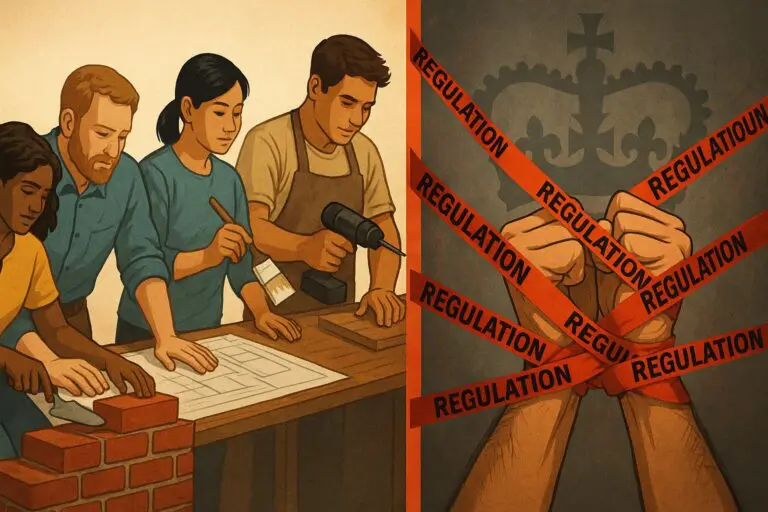
“News Flash: Illegal immigrants DO NOT HAVE RIGHTS. They are . . . (Are you ready?) . . . ILLEGAL.”
– A post of one of my Facebook “friends,” April, 2025
“Looking back, there have been 88,899 federal rules and regulations since 1995 through December 2016, . . . [and, during that same timeframe,] 4,312 laws.” (source) (That’s 93,211 in total, but who’s counting?)
Humans are made in the image of God, and yet we are pervasively corrupt and fallen. These aspects of human nature have implications beyond what are typically recognized in Christian circles. Among other things, we are sub-creators, makers, and laborers on a mission. We all should, in keeping with what Joshua declared for his household, “serve the Lord” (Joshua 24:15, ESV). Like Jesus, we should “be about my Father’s business” (KJV Luke 2:49), and as Paul exhorts, work always “as for the Lord” (Colossians 3:23, ESV). All our work, even if not explicitly religious, is to be the work the Lord has for us and should be done as if for him. Imagine being the person who steps in the path of a fellow laborer, stops him, takes his tools, maybe even binds his hands, and says, “No, you are doing it wrong. Let me show you how it’s really done.” … “Oh, and until you agree to do it my way, your hands remain tied.” If this strikes you as presumptuous and ungodly, then you are a proponent of liberty.
I read Jeffrey A. Brauch’s Flawed Perfection: What It Means To Be Human & Why It Matters For Culture, Politics, and Law shortly after coming across the Facebook post at the opening of this article, and Flawed Perfection thoroughly trounces the views expressed by the post. Brauch is a professor at Regent University School of Law and was its Dean during my time at Regent from 2005 to 2008. I have nothing but respect for Professor Brauch. His work expounds on fairly standard Conservative Christian belief systems, and yet the view expressed on the quoted post is sadly common among Christians. Essentially, human nature includes that we are created in God’s image and thus have inherent worth and dignity, and yet we (Christian notwithstanding) are fallen, corrupt, and corruptible, prone to dehumanizing those we deem to be harming us. Regardless of race, nationality, age, and cognitive ability, humans have various rights such as to life, basic humane treatment, and to defend ourselves. The views expressed in the Facebook post are antithetical to a Christian worldview of who humans are.
Flawed Perfection includes detailed explanations of how fallen humans commit government overreach by attempting to create utopia on earth and ban or regulate all sin. Sound libertarian? Maybe by logical implication, but reading it, you will not come away with that impression. It falls squarely in the tradition of standard Christian Conservatives. Humans have inherent dignity and worth and must be treated humanely, and we cannot proscribe every vice (for example, Brauch discusses disastrous alcohol prohibition and attempts to outlaw gambling). Restrictions on immorality should be limited, in the tradition of Thomas Aquinas, to that which is “possible for the majority to abstain.”
We must go further. The implications of human nature, particularly that we are made in the image of God, make a powerful case for Christian libertarianism. Oft ignored aspects of being created in God’s image help us clarify a reason or purpose for liberty. 1) God is the creator, Genesis 1:1, 2) God is a worker, Genesis 2:2. Humans are sub-creators, makers, and workers
J.R.R. Tolkien, most famous for his epic fantasy Lord of the Rings, discusses this in his essay “On Fairy Stories” in relation to writing fantasy. He describes humans in a short poem stating: “Man, Sub-creator, the refracted Light/ through whom is splintered from a single White/ to many hues, and endlessly combined/ in living shapes that move from mind to mind.”
God and his fullness of truth and life and light is the “single White” and humans use the light in endless combinations to do God’s multitudinous work on earth. “The Christian has still to work, with mind as well as body, to suffer, hope, and die; but he may now perceive that all his bents and faculties have a purpose, which can be redeemed.” Joshua says that “we will serve the Lord.” Tolkien describes us as “refracted Light.” Rulers and legislators respond: “Do your service. Do your refracting. Fine. But do it within the confines of all the rules and regulations we impose upon you.”
People are made to be workers and creators on a mission to exercise dominion over the earth. Yet what in the Dominion Mandate sets man over man?
I am mindful that the Bible is much more focused on sin and righteousness, the need for salvation, the way to salvation, grace, faith, love, and all such more overtly religious or “Christian” things. Scripture does not concern itself nearly as much with assuring people they can pursue certain lines of work without stumbling blocks the state puts before them. Political work and discussions such as this article certainly are secondary to the main thrust of scripture, yet it does not take a PhD ethicist to recognize that deflecting God’s people from their vocational callings is not a good thing.
God has more than enough work for everyone to do—productive, creative, mental, physical, all types and manner of work: “we dared to build/ Gods and their houses out of dark and light,/ and sowed the seed of dragons-‘twas out right/ (use or misused).”
Yes, we are fallen. What we do “can be ill done.” All our efforts, our manufacturing, our economics, everything, can go astray. Nevertheless, we must have freedom to work out our callings. Tolkien again:
Men have conceived not only of elves, but they have imagined gods, and worshiped them, even worshipped those most deformed by their authors’ own evil. But they have made false gods out of other materials: their notions, their banners, their monies, even their sciences and their social and economic theories have demanded human sacrifice. Abusus non tollit usum. Fantasy remains a human right: we make in our measure and in our derivative mode, because we are made: and not only made, but made in the image and likeness of a Maker.
Interestingly, Tolkien here directly calls out “economic theories” as an area for idolatry. Goodness knows we libertarians love our sound economic theories. The admonition from Mount Sanai to have “no other gods before me” Exodus 20:30 is as vital and binding as it ever was. And much has been written on idolatry to include much more than simply carving an image in wood or stone and worshipping it as a God. J.I. Packer writes: “As a creature, man yearns for a god to serve; as a sinner, he is resolved to play God himself, and demands that everything else should serve him.” (JI Packer, here)
Taking lordship over other human beings is an ultimate presumption which says, “The way for you to best serve God is by serving him within the bound of what I (the ruler, the king, the legislator) direct for you.” Is this not itself idolatry? We see this most emphatically in areas of religious practice. No Christian would tolerate a naked directive by the state to pray in a certain way, and we have the heroic example of Daniel on how to respond to such overreach, Daniel 6:10. Yet this principles applies in mundane, less obviously religious areas as well.
The Bible is not so worried about a ruler telling a person whether he has to pasteurize his milk before selling it, and why? Perhaps because it is focused on the subject, not the ruler. Live in a Godly manner despite the stumbling blocks that are put in your way. But do not yourself place such roadblocks. Jesus explicitly calls out gentile rulers:
“The kings of the Gentiles exercise lordship over them, and those in authority over them are called benefactors. But not so with you. Rather, let the greatest among you become as the youngest, and the leaders as one who serves. For who is the greater, one who reclines at table or one who serves? Is it not the one who reclines at table? But I am among you as the one who serves” (Luke 22:25-27, ESV).
Correctly reflect on yourself and others and your human nature and theirs; you and they are human beings made in the image of God, full of inherent worth and dignity, fallen and corrupt, and yet sub-creators, makers, workers, and fellow laborers.
Not everyone is a Christian, though—hasn’t all this talk of serving the lord been directed at Christians? More directly, yes, but not exclusively. No Christian argues that the non Christian loses his inherent dignity by not being saved. Who but a barbarian treats Christians with consideration of their humanity but looks at non Christians as sub-human? Are not all believers former unbelievers? How but through freedom do you walk that path from sinner to saint? Any unbeliever can join the church and family of believers at literally any moment, and freedom is the necessary and right status of human beings to enable them to relate directly and correctly to God.
We are to “work out [our] own salvation with fear and trembling” (Phil 2:12, ESV). We ought also to work out, with fear and trembling, our daily grinding, working, willing, creating, making, and laboring, between ourselves and God, not hemmed in, restricted, bound, fenced, manipulated, and taxed by other humans.
Articles posted on LCI represent a broad range of views from authors who identify as both Christian and libertarian. Of course, not everyone will agree with every article, and not every article represents an official position from LCI. Please direct any inquiries regarding the specifics of the article to the author.
Did you read this in a non-English version? We would be grateful for your feedback on our auto-translation software.



















































*by signing up, you also agree to get weekly updates to our newsletter
Sign up and receive updates any day we publish a new article or podcast episode!